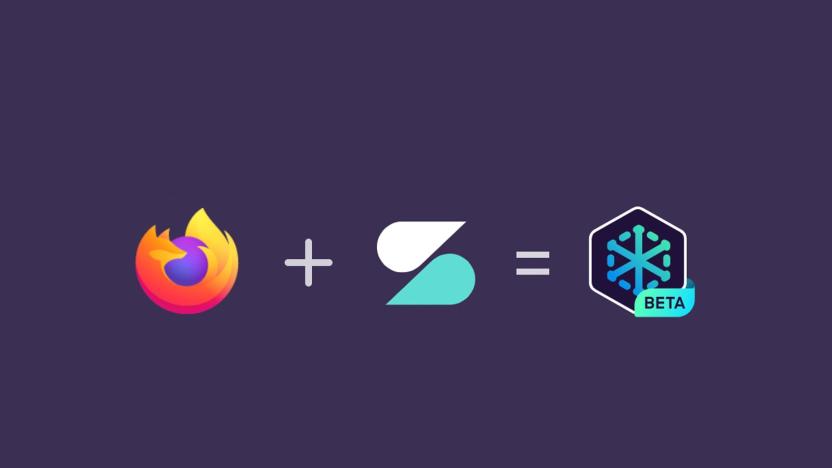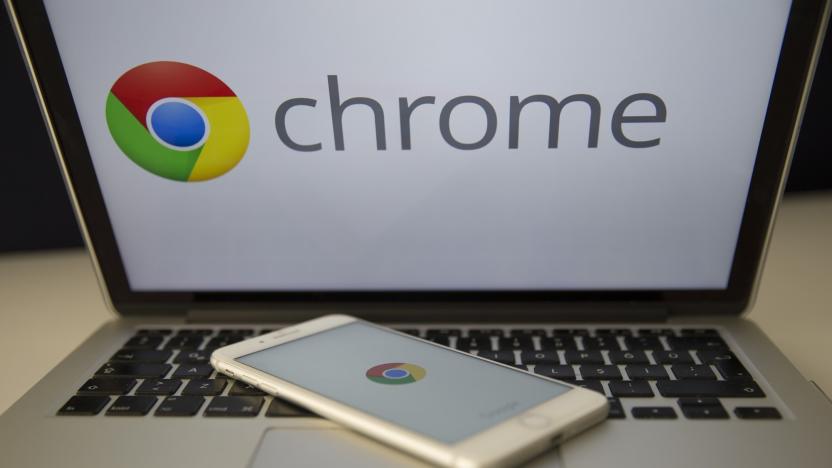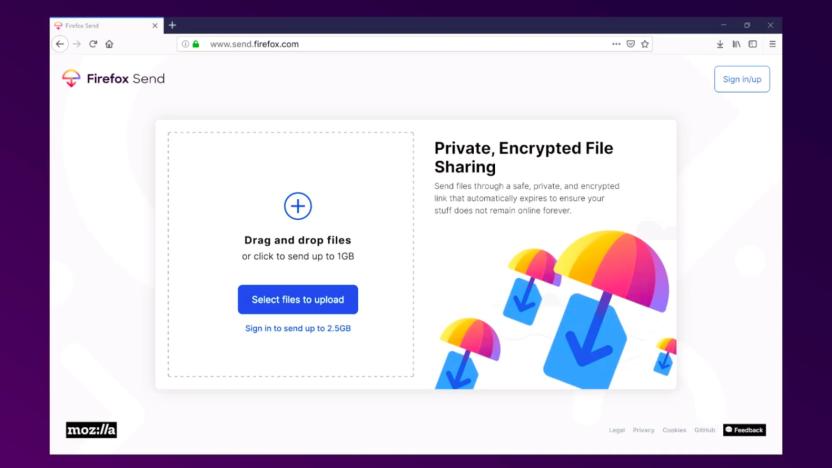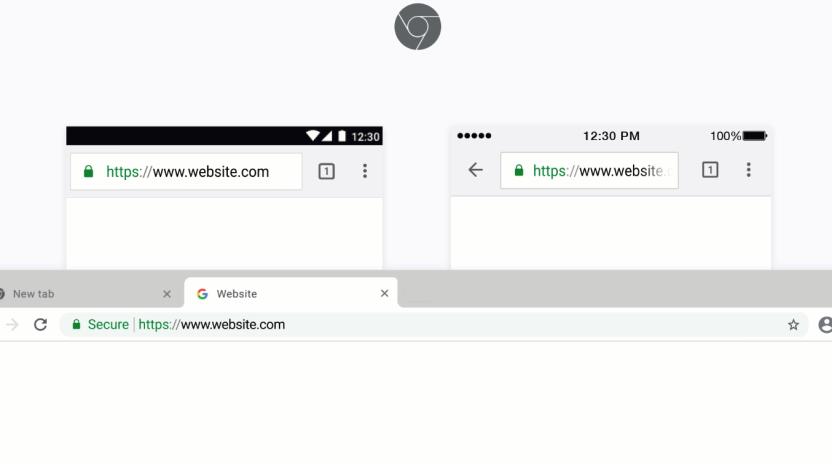web browser
Latest

Mozilla combines tracker blocking with paid, ad-free browsing
Last year, Mozilla partnered with Scroll -- a subscription service that enables ad-free browsing of its partner publications -- to analyze if a select group of users preferred paying a small fee rather than being served ads, and if the strategy was cost-effective for the publications. After seeing promising results, the two companies have announced the Firefox Better Web with Scroll beta program. The name is a mouthful, but essentially, it combines Firefox's tracker-blocking technology with Scroll's ad-free experiences on any browser. Users can opt in and pay an introductory price of $2.49 for the service, which enables them to read publications like The Atlantic, The Onion and USA Today, add-free. The publications, meanwhile, receive a share of the revenue that Scroll makes from the subscription costs.

Chrome will start protecting users from insecure downloads in April
Google Chrome will soon deliver on last year's promise to better protect users from insecure content -- downloads not encrypted via HTTPS -- on otherwise secure pages. Chrome 82, which will be released in April, will be the first version of Google's browser to warn users before allowing them to download certain insecure file types. In future releases, they'll be blocked outright.

Chrome users can control media from a centralized toolbar button
One of the more frustrating aspects of modern web browsing is that it's easy to forget which tabs have videos or songs playing. This makes it difficult to pause your media quickly when you have to answer a call or pay close attention to an email. The latest Chrome update helps fix that by adding a new button that gathers all the media playing in your browser and displays play, pause and skip buttons for each one.

Firefox gets picture-in-picture video playback on Windows
One of the hardest things to do while multitasking is watching a video. Even if you open a clip in a new window, you often have to keep moving it around your screen so it's not blocked by all the clutter on your screen. Mozilla's new Picture-in-Picture feature for Firefox pins just about any video to your screen and prevents other tabs or windows from obscuring it.

Brave says 8.7 million people use its privacy-focused browser every month
Almost four years after its first release, privacy-focused web browser Brave is officially launching. Starting today, you can download version 1.0 of Brave on Android and iOS, as well as on Windows 10, macOS and Linux. With Brave 1.0, you can now use the company's opt-in ad platform and enroll in Brave Rewards on both iPhone and iPad. In short, this is the release where you can seamlessly use almost all of Brave's marquee features across all platforms.

Firefox 69 blocks cookies and crypto-mining tracking by default
After announcing new security efforts in June, Mozilla is now rolling out the features for all Firefox users on Windows, Mac, Linux and Android. By partnering with Disconnect, Firefox will now block third-party cookies; it can also block crypto-miners from accessing users' hardware. With Firefox 69 (rolling out today), these options will be enabled by default.

Firefox will soon protect you against crypto-mining scripts
At a time when every high-profile data breach sheds more light on how web activity is monitored, Firefox is launching anti-tracking tools to protect against fingerprinting and crypto-mining. Mozilla is again teaming up with Disconnect -- a software company that provides no-tracking software and whose ad tracker blocklist Firefox already utlizes for its tracking protections -- on the new tools. Both of the blocking methods are available to Firefox Nightly 68 and Beta 67 testers. Mozilla plans to enable them by default in a future release.

Firefox Send's free encrypted file transfers are now available to all
Mozilla has made privacy Firefox's calling card, while lambasting companies it believes don't meet the bar on security. Its latest update to its web browser, an end-to-end encrypted file transfer service, fits the mold. Firefox Send was introduced in 2017 as part of the now-defunct Firefox Test Pilot, which allowed early adopters to try out experimental features, and is now being graduated. Those with Firefox accounts can now share files up to 2.5GB in size between browsers, while everyone else is limited to 1GB. It's also getting its very own Send Android app in beta.

Google isn't killing 'www' in Chrome just yet
Google's grand plan to rethink the URL has suffered a temporary setback after it was forced to reinstate the axed "www" in Chrome's address bar following user outrage. It now wants the public to weigh in on the change but claims it will correct course again with the release of Chrome 70.

Mozilla is bringing modern video games to your browser
Modern 3D video games require a ton of processing power to look good and respond to player input quickly. That's why most of the web-based games you see today are at best stripped down versions of their PC or console counterparts. The team behind the Firefox web browser would like to see that change, however. Mozilla released a version of the browser that includes WebAssembly - a new technology that enables high-resource apps like games, computer-aided design, video and image editing and scientific visualization to run in a browser almost as fast as they do on your local computer. It will also speed up existing web apps that use JavaScript.

Chrome annoys me, or: "I'm in an abusive relationship with Google".
When I first starting using the Internet it was barely an Internet at all. It was more of an internet.We used Netscape Navigator to browse in monochrome, and suddenly we had pictures and text on pages instead of bulletin boards and clunky communication. Like all revolutionary steps, especially in technology, it was awesome, and then became commonplace, and then became annoying as we started to feel the limitations and desperately want upgrades and new features.And now we have maturity and iterative changes, and 3 or 4 browser vendors controlling, quite literally, everything.I'd like to say, publicly and for all to hear, that I love Mozilla and Firefox, but it wasn't always the case. By the time Chrome came along Firefox was competing with Internet Explorer by way of it's features list. As a result it was bloated, heavy, sluggish and complex. It also had kind of a techie feel to it, and leaked memory like nobody's business.And here comes Google. Their browser is fast, simple, fast, pretty, easy to use and fast. I loved it. Everyone loved it. It changed everything.And now the inevitable switch has happened. Firefox, in an attempt to keep up and not lose relevance, has completely re-invented itself. While Chrome has become slow, sluggish and stagnant, Firefox is good looking, fast, easy to use and is still a pillar in the world of open source software.I would absolutely, completely and utterly love to use Firefox as my main driver every day, but I can't.I just can't leave Chrome. I want to leave. It doesn't treat me well, doesn't respect me and always makes me feel a little dirty and used. But I can't leave. I feel trapped, and sometimes a little weak; giving in to my love of convenience and reliance on a couple of key features, rather than standing strong and saying "NO! Chrome. You're not good for me. I'm leaving you for this open source browser over here that cares about ME, not just my browsing habits and personal data".But I don't do that. Occasionally I try. I update Firefox to the latest version, use it to surf for a couple of hours, import my bookmarks and go to some of my favourite websites.But then, inevitably and predictably, I return to Chrome's warm and familiar embrace... and each time I hate myself a little more.Look, I know that depending on which direction you're facing when you look at them Google are either completely awesome or despicably evil. I have an Android phone which I pick up and say to it "navigate to work" and it gives me the best route based on real time traffic data. I take photos with it and Google keeps them safe for me in my unlimited storage, and it tells me where my car is when I lose it in a car park. To top it all off it doesn't cost me a penny. I love them for that. Their services consistently rock my world. On the other hand, I know that the reason they give me all these things for free is because they are constantly exploiting every aspect of my life to increase their bank balance, and I let them do it. I bend over and let them use me every day so that they'll keep giving me free stuff.I use Google products with my eyes open. I know what they want from me, and I give it to them willingly, and in return they give me access to revolutionary technology for free, and keep making it better without me even asking.Chrome is slightly different, however. As a web browser I think Firefox is better. There is a superior alternative out there, and even taking into account my willing dependance on Google's ecosystem in many ways it's still a better option. So why, I hear you cry, do I keep coming back to Chrome?The answer is there are one or two things which I use every day that only Chrome does, or that Chrome does best. It's really that simple. If Firefox would simply implement or improve one or two small things I would switch in an instant. I really would. But they don't. So here I sit writing this in a Chrome browser window. Damn you Google.The Chrome features I can't live without are not really obscure techie features either. Things like Netflix and WhatsApp in Linux (OK maybe that's a BIT techie - bit it's changing), extensions as desktop apps (the Mac REALLY needs this feature) and their simply flawless browser login and data synchronization feature are not things that only I use. Surely Firefox can make these things better? Please?Yes, I know that Firefox can do the whole log-in-to-the-browser-and-sync-your-stuff thing, but despite them completely rebuilding the whole thing it still pales in comparison to Google's effort in terms of usability, visibility of what it's doing and quite frankly the the fact that it just does what I want it to do when I want it to do it. And this is representative of the whole problem... Firefox is just slightly behind on design, usability and features all the time, and it makes it very difficult to leave Chrome behind.Despite being astonishingly memory hungry, a lot slower than it was, and kinda stale in it's design and core functionality Chrome just works, and I don't have to think about it.I really hope this changes in the near future. I hope that Mozilla sit down with Chrome for a few days and say "let's make Firefox do everything that this does, but better and prettier".Until then I'm just going to go and install Firefox on my office iMac and use it to browse the net for a couple of hours. It helps me to feel a little bit better about myself.

Happy 12th Birthday, Safari!
Kids just grow up so quickly... On January 7, 2003, Steve Jobs announced at Macworld San Francisco that Apple had developed its own web browser called Safari. On that day, the first beta version was released. Apple based Safari 1 on its internal fork of the KHTML rendering engine known as WebKit. Four years later, almost to the day on January 9, 2007, Jobs announced the iPhone and noted that it would use a mobile version of the Safari browser. Six months later, at the 2007 WorldWide Developers Conference, Jobs announced Safari 3 for Mac OS X v10.5, Windows XP and Windows Vista. At the time, Safari 3 was the fastest web browser for Windows. Of course, the company has since dropped support for Windows. The latest iteration of OS X Safari is version 8, released with OS X 10.10 Yosemite. It includes WebGL support for native 3D browser experiences; IndexedDB, which allows structured data to be cached client side and store data for web applications; JavaScript Promises, which lets JavaScript authors to work with asynchronous programming patterns more easily; CSS Shapes and Compositing, which means that websites can flow text around images and geometry shapes; SPDY, an open protocol websites can adopt for speeding up page loads and improving security; and HTML5 Premium Video, to deliver encrypted and energy-efficient video to the browser. We can't wait to see what happens to Safari when it becomes a teenager next year... Meanwhile, here's the announcement of Safari at Macworld in 2003.

Breach is a completely modular, hackable and open source web browser
When it comes to surfing the web, our options are limited: the market is dominated by three or four mainstream web browsers, all of which share major similarities in design and function. Unless you want to build your own browsing program, you're stuck with their modern browsing paradigms. For San Francisco programmer Stanislas Polu, that wasn't good enough, so, he created Breach -- an open source modular web browser designed to allow anybody to tweak and modify it on a whim.

Opera Coast is ready to impress you... and then be forgotten
Do you remember Yahoo Axis? It was an iOS Web browser that it seemed as though everyone thought it was the second coming of the mobile Web. It was called "impressive," "surprisingly fresh," and "one of the best Web browsers," only to be unceremoniously killed off after everyone forgot about it. Well, get ready for round two, because Opera Coast is about to pull the exact same stunt. This morning the blogosphere and social media are peppered with opinions that Coast has done something with mobile Web that has never been done before. The gimmick here is that Web pages are arranged on the Coast home screen as though they were apps. You can create these icons based on pages you visit often, but these eye-catching buttons are really nothing more than bookmarks in practice. There's also no real URL bar, so don't expect to type in a link as you might on Safari or Chrome for iOS. Instead, there's a search feature that does its best to provide the results you're looking for. Type in "TUAW" and an icon with our site's logo pops up. Click it to travel to the site, which pops up in its own window. Recently visited sites are organized in a stack on the home screen, and sites can be scrolled through using touch gestures, as you might click through your various browser tabs. In short it's more complex under the guise of simplicity. Instead of tabs you have pages, and instead of bookmarks you have icons. There's nothing here that makes it any better or worse than the existing crop of Web browsers on your iPhone, except for the fact that it's "new." "Browsers have been the same way for 20 years and their conventions get in the way," reads the passive-aggressive App Store description for Opera Coast, and that much is true. Is there a better way to browse the Web than what we currently have? Perhaps, but Coast isn't it. It's simply the same Web in a slightly different wrapper. If you feel like your web browser needs a wallpaper -- which is perhaps the one thing that Coast offers that hasn't been done before -- it might be your new favorite app. But for the vast majority who download it, the return to Safari or Chrome will be expeditious.

Chrome 29 brings more intelligent omnibox suggestions, while Android users nab WebRTC support
Those with a hearty level of respect for beta builds have been enjoying these spoils for weeks now, but Google has today seen fit to push Chrome 29 and a refreshed Chrome for Android out to rest of us. Effective right now, Chrome 29 users on the desktop will see "improvements to omnibox suggestions based on the recency of websites visited, resulting in more timely and contextually relevant suggestions." Interestingly, Google has also added a "Reset browser settings" option for those who end up going a bit overboard with extensions; thankfully, waving the aforesaid white flag won't impact your themes, apps or bookmarks. On the mobile front, Chrome on Android is being updated with improved scrolling and startup performance, as well as WebRTC support that will enable video conversation directly in the browser without a plugin. Yeah, we thought you'd dig that.

Dolphin browser for Android adds redesigned UI, new store for web apps
Dolphin has done a pretty fine job when it comes to keeping its browser loaded with plenty of handy features, both on Android and iOS. Now, the Dolphin's hit version 10 for Android, bringing along an array of things including a revamped user interface, drag-and-drop support for speed dials on the home screen, additional swipe-based gestures and a new store for web-based applications. In addition to all that, Dolphin brought back support for Adobe Flash, while also taking to this release to improve the built-in search options and allow users to dig through sites like Amazon, Twitter, Wikipedia and YouTube right from within the app. The overhauled Dolphin browser is now available on Google Play, so give the source below a quick click if you're eager to check out these changes.

Apple announces Safari upgrades as part of OS X Mavericks
Apple has announced an updated version of Safari at WWDC. The browser update adds a new home page featuring a Top Sites feature that stores all of your bookmarks and regularly read sites. Using a new bookmark bar, you can easily add and remove links to your Top Sites selection. They've also introduced a "Reading List" feature to the home page that allows you to quickly jump from story to story on the sites you read the most. Safari also now has Twitter and LinkedIn integration that allows you to monitor and open links shared in those services within the browser using another sidebar. Enhancements have also been made under the hood of the program, including improved Javascript support. In addition, Safari now uses far less memory and is better at power management than other browsers. To quote Craig Federighi "When you compare [Safari's energy efficiency] to Firefox, it's actually kind of sad."

Camino web browser reaches its end of life
The developers of the venerable Camino web browser announced yesterday that the product is no longer being developed and that users should move on to "a more modern browser." As the team blog notes, "Fortunately, Mac users have many more browsers to choose from than they did when Camino started 10 years ago." Camino devs have gone on to create Safari, Chrome and Firefox, all of which are under active development and in use by millions. There's one overriding reason to switch from Camino; it isn't receiving security updates. It's time to move on...

Nook Simple Touch reportedly getting web browser, email client on June 1st
Remember that web browser that was found hiding in the Nook's search function? It's time could be nigh. According to a leaked memo acquired by TechCrunch, Barnes & Noble will be updating the Nook Simple Touch and Simple Touch with Glowlight with an email app, web browser and an updated store next month. The update will reportedly be sent over the air starting on June 1st and rolling out to all devices in the following weeks. The idea isn't too far fetched -- the Simple Touch is running a skinned version of Android. Nook owners not willing to wait for the official patch can always root the device of course, which comes with some peripheral advantages. Check out TechCrunch for a look the full memo.

Chrome 24 fixes two dozen bugs, promises to speed things up
Google's latest browser update landed today with little fanfare from Mountain View -- just a tiny blog post proclaiming a faster, more stable Chrome. Diving into the build's change notes, however, reveal Flash updates, bug fixes and support for MathML. Not a lot in the way of consumer facing features -- though Bookmarks are now searchable, via the Chrome omnibox. Not as fancy as the last release, but we never to scoff at stability and speed. Check it out at the source link below.









